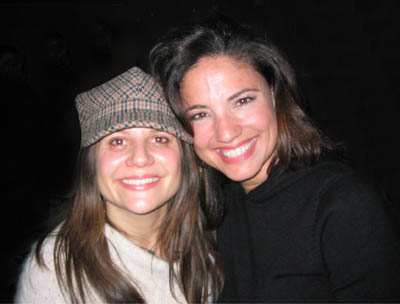
By Stacey Gualandi/August 13, 2013
TWITTER: @dreamwithmefilm
Henri Hebert (@henrihebert) first began her career as an intern and assistant to Pam Burke, the founder of The Women’s Eye. Cut to two decades later and she is now a full-fledged documentary filmmaker. And she’s not shying away from the tough subjects.
“We wanted to answer the question: Why do 1.2 million high school kids drop out of our public school system every year? We walked away from our producing careers so we could film an entire year…” Henri Hebert
When I first met Henri Hebert, she and her producing partner Kimberly Goodman were working on their fifth documentary short film, Dream With Me. This labor of love explores America’s public educational system. But the story behind the making of the film shows the not-so-glamorous world of independent producing.
Henri candidly revealed to me how the process took its toil financially; how it almost ended a friendship; and whether–in the end–the journey was worth all the heartache…
EYE: What got you both involved in this Dream With Me project?
HENRI: Kimberly Goodman and I met working as reality TV producers on shows like The Biggest Loser, Project Runway and The X Factor. We realized that we shared the same dream; we both wanted to tell stories that could make a difference. Our focus soon became the country’s broken educational system.
In 2008, we stumbled across a report about the number of kids dropping out of high school; those figures were alarming. So we wanted to answer the question: Why do 1.2 million high school kids drop out of our public school system every year?
We walked away from our producing careers so we could film an entire year in an elementary, middle and high school in Los Angeles. It took nearly two years until we finally got our answer, and we saw that change really is possible. After four years of working on Dream with Me, we are extremely happy to be able share our completed short film.
EYE: How did you get unprecedented access to three schools for a year?
HENRI: In an earlier project, Real Beauty, we filmed in a charter school in Los Angeles that had lost their facility. The children were going to school in a rundown working motel. That sparked our interest in finding out what was happening in our schools.
We started doing research and became determined to get complete access to three different schools. We began talking to different school systems when then-Los Angeles Mayor Antonio Villaraigosa’s office called us. They had seen Real Beauty at an event and wanted to know our goals. Within three weeks, we drew up contracts, quit our jobs and began filming.
“It was important for us to not just be there to film but to be able to help out those who were being so generous with their time and access.”
EYE: What were the highs of the process?
HENRI: There were a lot of highs while filming–for example, watching good teachers work their magic in the classroom and inspiring kids to reach their potential. We became a part of their community. At times, we put the cameras down to help out. If there was a shortage of teachers, we would watch a classroom.
We set up a photo booth at the school dance so the kids could have take-home memories. When we found a classroom of computers that were still in boxes, we hooked up all the computers.
It was important for us to not just be there to film but to be able to help out those who were being so generous with their time and access. Students went to the Principal to keep me in their classroom after a substitute teacher wanted to throw me out.
 STACEY: Were there any low points?
STACEY: Were there any low points?
HENRI: There were ‘shooting drills’ at the elementary school. We grew up with fire drills; these kids have shooting drills in Watts because of gang violence.
Also, ‘Pink Slip Day.’ Administrators and teachers had worked hard all year to then find out they may or may not have a job the next year. For a week, the teachers were depressed and the kids didn’t really understand what was happening.
In the last six months of filming, we lost some of our funding and had sunk all of our personal finances into this. We thought we might end up homeless. It was scary. We were eating at the schools because the lunch was $2.50. There were moments when we had to recycle bottles to get gas money.
That had to be the worst time in my life. To this day, I don’t understand how we managed to get through it. What I do know is that Kimberly and I always eventually finish what we start. Even through the worst of times, we had a shared goal and passion, so through sheer will and determination, we kept going.
“Kimberly and I became so depleted emotionally, physically and mentally, that we were running on fumes and the stress of bringing in money almost broke up our friendship.”
EYE: You mention passion. How did your passion for this project takes its toll?
HENRI: This became our entire life, 24/7, for two years. We sacrificed personal relationships. People thought we were crazy and that it was a waste of time.
Kimberly and I became so depleted emotionally, physically and mentally, that we were running on fumes and the stress of bringing in money almost broke up our friendship. The lowest of the low for me came when I realized this cause had come between us. I let the cause become more important than my family, friends, and the person I trusted the most.
I am really sorry that I did that. I hurt them by pushing them away. At key moments, I wasn’t there when I should have been. Instead, I was in Watts with strangers, helping them out.
 STACEY: What life lessons did you learn?
STACEY: What life lessons did you learn?
HENRI: I learned a hard lesson about life and balance. It almost cost me a really important relationship with my best friend.
Somehow, Kimberly and I found our way back to the friendship. We have a stronger and more balanced relationship today. And we learned from Dream with Me what is really important, and to never stop laughing. In the end, it all works out, but just don’t forget to enjoy the journey.
EYE: What were your observations about the education system before and after filming?
HENRI: We were extremely hopeful and naïve going into the schools. But being there full-time showed us the deepest cracks in the system. It’s so broken that it’s working against the children who are trying somehow to survive.
I once witnessed a substitute teacher pushing an 11-year-old against a locker and using a chokehold. Two teachers walking in front of me looked, shrugged their shoulders and kept walking. I was stunned and horrified.
“It dawned on me that the teachers were so exhausted and depleted from this unrelenting broken system that they have shut down.”
It broke my heart for the teachers and for the kids. A child was being abused and no one was stopping to help. Police eventually escorted the substitute teacher off school grounds, but the system is so broken that two days later, when the school needed a substitute teacher, he arrived back on campus. The principal stopped him and said you can’t be here. So that day, we all took turns substituting for that classroom.
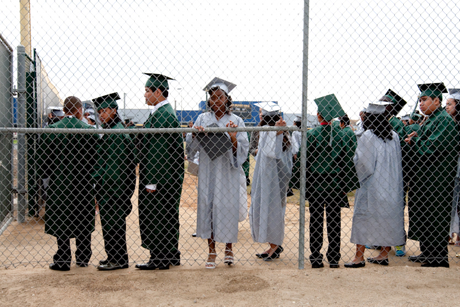
Credit: Dream with Me/FiveFold Productions
STACEY: Did you feel comfortable becoming involved in the school to such an extent?
HENRI: Some would argue that we shouldn’t interfere, but morally, how do you come to the school to give voice to the children but then don’t really help them when you have a chance? During the filming, we decided early on that it is all of our jobs to protect them and help them out.
We did put the cameras down to lend a hand, and we are more proud of that than anything else. What we hope for now is that our documentary short can provide insight and perhaps inspire others to help out their local schools. It is going to take all of us to each lend a hand.
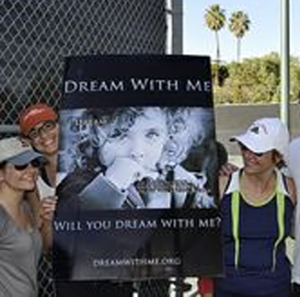 EYE: What is the core issue facing our public education system?
EYE: What is the core issue facing our public education system?
HENRI: It’s a complicated problem that has many layers. For example, at Ritter Elementary, fifth graders couldn’t read, but were being socially promoted each year. And many high school kids who wanted to drop out couldn’t read.
Ritter’s principal Charlene Green, who had come out of retirement, decided the students needed to be inspired to read.
Charlene asked us if we would help out with the first Ritter Elementary School Read Aloud where members of the community come to read to a class. Students love being read to and always have great questions.
The teachers then found the students wanted to go to the library to take out books in the following weeks. We got about 30 of our friends to join in. We also got Jamie Lee Curtis to come read to the kids. This year we went to our 5th Ritter Elementary School Annual Read Aloud.
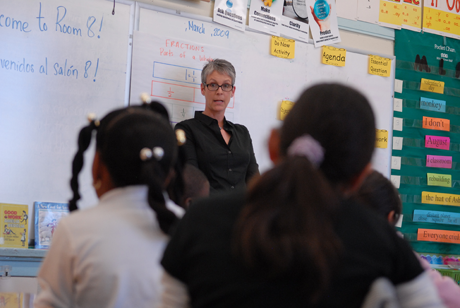
EYE: Was it all worth it in the end for you and Kimberly?
HENRI: On a personal and professional level, Kimberly and I took a huge risk to tell a story we felt passionate about. We were courageous, bold, curious and caring with a genuine interest to give voice to the truth of what is happening in our classrooms in America.
Learning about how a school functions in a community then becoming part of it was a really special time for all of us. We were in a poverty-stricken area yet we had so much care in the school from the staff and support of the community that we felt the riches from this care.
“To children, it is always about the caring. When I found a teacher that cared, that is when I saw how many students were really learning in his or her classroom.”
STACEY: Ultimately, why do you think you made this film?
HENRI: What pulled us into the schools were the untold stories of the children. We saw so many children suffering silently because they had no voice. We did it for the kids. We believe children are a good investment of our time.
We had never fundraised before but as reality TV producers we figured how to apply our crafty ways to film and fundraise at the same time. Looking back, it was an incredible undertaking. We were naïve in understanding how big of a venture this would be.
Hindsight is 50/50. If we knew then what we know now, would we walk away from secure high-paying jobs as reality producers to go into a world of such unknown? We would. We now have this product that we both feel so proud of for so many reasons. We set up to do something and we did it.
EYE: Henri, thanks for being so candid. We are very proud of you. Next project? Or take a break for awhile?
You can find out more about Dream with Me here.
Thanks to Henri and Kimberly for the use of the photos in this article.
###


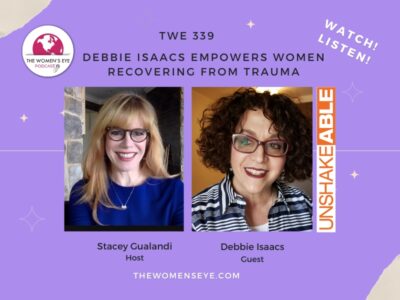
Reading this story one word jumps out loud and clear: Dedication. What Henri documented really hit a nerve and is a product of real perseverance. Shedding light on a situation that demands dedication, and in too many cases fails, was certainly a bold undertaking. Understanding the real “glamor” of production was also honestly articulated. Henri and Kimberly are really making a difference now and for the future. I hope DREAM WITH ME is a tremendous success!
Hi Pat,
Thank you so much. Kimberly and I really appreciate your words and support. Our hope is to keep spreading the message about the children and schools needing our support. Too many kids are graduating without adequate skills and some can’t even read. And many of our administrators and teachers are trying their best with what they have to work with. We hope through our film that more people are inspired to give back to their local school community. We learned early on that it was actually easy to make a difference in a school…just showing up to lend a hand where needed was so helpful to the school community. As the saying goes…”It takes a village to raise a child…”
Thank you again for taking the time to read our story, watch our film and leave us a wonderful comment.
Henri and Kimberly
Wow…just watched the video. It was heartbreaking but enlightening. What an amazing thing you and Kimberly have done here! I am so proud to finally see all of your years of hard work come to fruition after such an extraordinary effort. If only we could make more of these projects that make a difference without it taking years of work, all of your life’s savings, and such an uphill battle for people to pay attention! Such a shame that a reality show will bring in millions of viewers but when you want to actually talk about serious issues it’s hard to get the word out. I hope the articles continue as you deserve it.
The interview with Ms. B brought me to tears. “They would rather be bad than dumb.”
Thank you Monica! Kimberly and I are so grateful for your support. Thanks for sharing it on Facebook. . xoxo